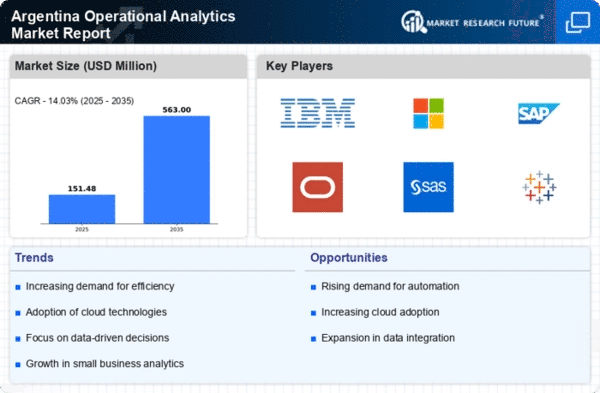Rising Demand for Data-Driven Decision Making
The operational analytics market in Argentina is experiencing a notable surge in demand for data-driven decision making. Organizations across various sectors are increasingly recognizing the value of leveraging data analytics to enhance operational efficiency and drive strategic initiatives. This trend is evidenced by a reported growth rate of approximately 15% in the adoption of analytics tools among Argentine businesses. As companies strive to remain competitive, the integration of operational analytics into their decision-making processes appears essential. This shift not only aids in identifying inefficiencies but also facilitates informed forecasting and resource allocation. Consequently, the operational analytics market is likely to expand as more organizations prioritize data-centric strategies to optimize their operations.
Growing Importance of Real-Time Data Processing
The operational analytics market in Argentina is witnessing a growing emphasis on real-time data processing capabilities. As businesses strive to respond swiftly to market changes and customer demands, the ability to analyze data in real-time has become increasingly critical. This trend is particularly evident in sectors such as retail and logistics, where timely insights can lead to improved customer experiences and operational efficiencies. Reports indicate that companies utilizing real-time analytics have experienced up to a 20% increase in operational efficiency. Consequently, the demand for solutions that facilitate real-time data processing is likely to propel the operational analytics market forward, as organizations seek to harness the power of immediate insights.
Emergence of Small and Medium Enterprises (SMEs)
The emergence of small and medium enterprises (SMEs) in Argentina is significantly impacting the operational analytics market. As SMEs increasingly adopt analytics tools to enhance their operational capabilities, the market is likely to experience substantial growth. These enterprises are recognizing the potential of operational analytics to improve efficiency, reduce costs, and drive innovation. Reports suggest that SMEs account for over 90% of the total business landscape in Argentina, indicating a vast opportunity for analytics providers. The growing accessibility of affordable analytics solutions tailored for SMEs further supports this trend. Consequently, the operational analytics market is expected to expand as more SMEs leverage data analytics to gain a competitive edge.
Increased Investment in Technology Infrastructure
Investment in technology infrastructure is a key driver of the operational analytics market in Argentina. As organizations recognize the necessity of robust IT frameworks to support advanced analytics, there has been a marked increase in capital allocation towards upgrading systems and tools. This trend is reflected in a reported 25% rise in IT spending among Argentine firms, particularly in sectors such as finance and manufacturing. Enhanced infrastructure not only enables the deployment of sophisticated analytics solutions but also ensures data integrity and security. As businesses continue to prioritize technological advancements, the operational analytics market is poised for growth, driven by the need for reliable and efficient analytics capabilities.
Government Initiatives Supporting Digital Transformation
In Argentina, government initiatives aimed at promoting digital transformation are significantly influencing the operational analytics market. The Argentine government has launched various programs to encourage the adoption of advanced technologies, including analytics solutions. These initiatives are designed to enhance productivity and innovation across industries. For instance, funding opportunities and tax incentives for technology investments have been introduced, which may lead to increased spending on operational analytics tools. As a result, businesses are more inclined to invest in analytics capabilities, thereby driving growth in the operational analytics market. The government's commitment to fostering a digital economy suggests a promising future for analytics adoption in the country.
















